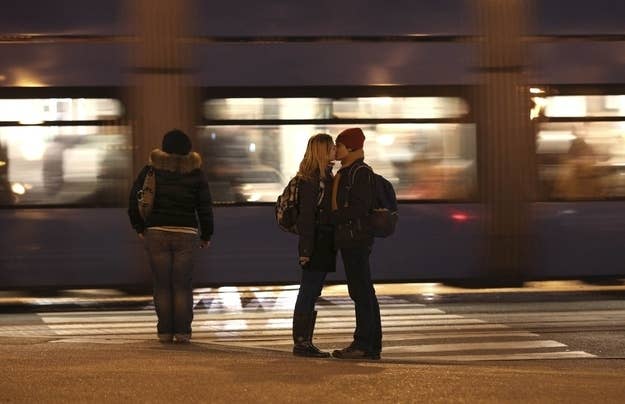
Human rights advocates in Croatia are concerned that a referendum on Sunday that approved a constitutional amendment banning same-sex marriage could encourage other efforts to curtail human rights through the ballot box.
The amendment, which passed with 65% of the vote in a low-turnout referendum, defines marriage as the union of a man and a woman. It was put to a vote after an organization called In the Name of the Family collected more than 700,000 signatures earlier this year. Although when Croatia joined the European Union earlier it had to pass a law banning sexual orientation discrimination in the workplace, some member states also ban same-sex marriage in their constitutions.
"The state institutions have simply failed to protect [the] human rights of a minority from [a] referendum," said Sanja Juras of the Croatian lesbian organization Kontra.
Human rights organizations had appealed to parliament and the country's constitutional court to block the referendum by arguing that minority rights should not be subject to a popular vote.
Though Prime Minister Zoran Milanovic had voiced opposition to the initiative, his government allowed the vote to proceed over the strong objections of human rights groups. A parliamentary commission initially sought to avoid a confrontation by allowing the vote to proceed but requiring parliament to ratify the referendum if it passed. But then the full parliament removed this back-stop and voted 104-13 to put the question directly to voters.
The constitutional court also tossed out an appeal to block the referendum in mid-November.
The European branch of the International Lesbian and Gay Association put strong blame on the country's political leaders for allowing the vote to proceed.
"We believe human rights and issues concerning minority groups cannot and should not be subjected to the popular vote in the first place," ILGA-Europe co-chair Gabi Calleja said in a statement. "In a democracy, elected officials have a clear responsibility to safeguard human rights of everyone and not to allow democratic tools to be abused to restrict the rights of minority groups."
Even before the initiative passed, there was concern that it had opened a Pandora's box. It was the first referendum under Croatia's new constitution to be put before voters thanks to a citizens' petition, and already signatures are being collected to put a referendum on the ballot designed to limit the rights of ethnic and linguistic minorities. It is targeted at ethnic Serbs, whose language is written in the Cyrillic alphabet instead of the Roman one used by Croatians.
Milanovic, the prime minister, vowed not to allow that initiative to come to a vote.
"The anti-gay referendum was just a preparation for an anti-Cyrillic referendum — but this one won't be held, regardless of how many signatories the organizers collect," he said as the polls closed on Sunday. The comments further enraged LGBT activists, who wondered why his government had not taken a similar position regarding the marriage amendment.
"There is a hierarchy of human rights" for the Croatian government, said Kontra's Juras. Despite comments in opposition to the marriage amendment, she said, the government's unwillingness to put a stop to the referendum means "the government itself promotes this kind of discrimination and segregation" against the families of gays and lesbians.
Edo Bulić of the Croatian LGBT organization Iskorak said he continued to hold out hope for a proposal for civil partnerships that Milanovic has pledged to bring up in coming weeks. But Juras said the government's track record on LGBT rights — including its failure to stand up to the referendum — made him fear that the government would not have the stomach to fight for partnership legislation that would establish full protections for LGBT couples.
"We [have been] treated as second-class citizens, and [now] our constitution defines us as second-class citizens," she said.
